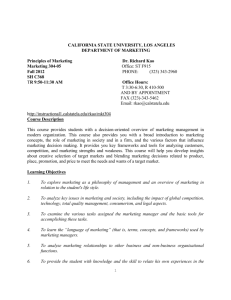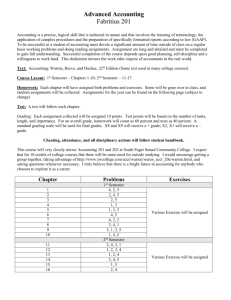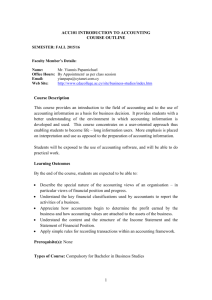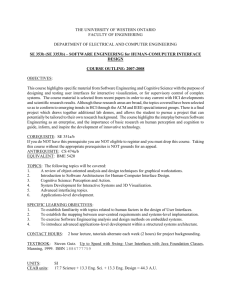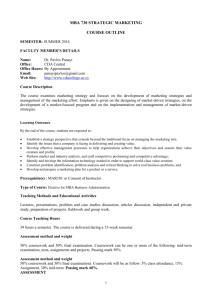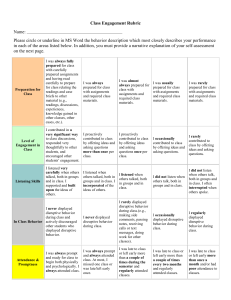HM 211 Organizational Behavior
advertisement
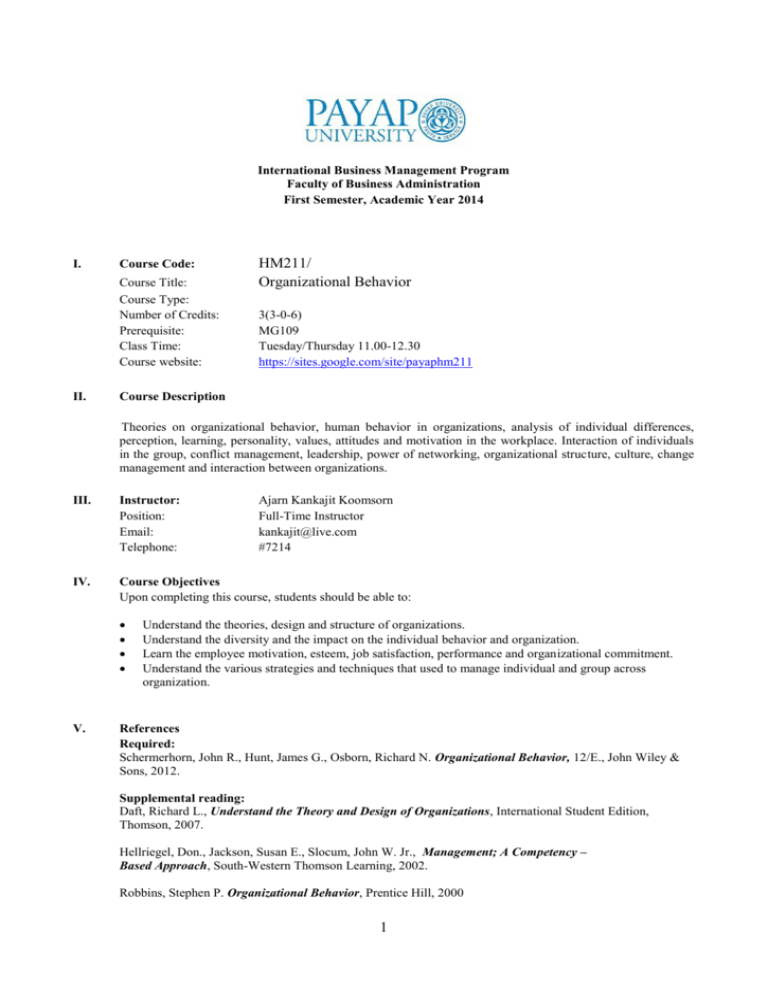
International Business Management Program Faculty of Business Administration First Semester, Academic Year 2014 I. Course Code: Course Title: Course Type: Number of Credits: Prerequisite: Class Time: Course website: II. HM211/ Organizational Behavior 3(3-0-6) MG109 Tuesday/Thursday 11.00-12.30 https://sites.google.com/site/payaphm211 Course Description Theories on organizational behavior, human behavior in organizations, analysis of individual differences, perception, learning, personality, values, attitudes and motivation in the workplace. Interaction of individuals in the group, conflict management, leadership, power of networking, organizational structure, culture, change management and interaction between organizations. III. Instructor: Position: Email: Telephone: IV. Course Objectives Upon completing this course, students should be able to: V. Ajarn Kankajit Koomsorn Full-Time Instructor kankajit@live.com #7214 Understand the theories, design and structure of organizations. Understand the diversity and the impact on the individual behavior and organization. Learn the employee motivation, esteem, job satisfaction, performance and organizational commitment. Understand the various strategies and techniques that used to manage individual and group across organization. References Required: Schermerhorn, John R., Hunt, James G., Osborn, Richard N. Organizational Behavior, 12/E., John Wiley & Sons, 2012. Supplemental reading: Daft, Richard L., Understand the Theory and Design of Organizations, International Student Edition, Thomson, 2007. Hellriegel, Don., Jackson, Susan E., Slocum, John W. Jr., Management; A Competency – Based Approach, South-Western Thomson Learning, 2002. Robbins, Stephen P. Organizational Behavior, Prentice Hill, 2000 1 Hellriegel, Don., Jackson, Susan E., Slocum, John W. Jr., Organizational Behavior, 9/E, South-Western, 1998. George, Jennifer M., Jones Gareth R., Understanding and Managing Organizational Behanior, 5/E, Pearson, 2008. VI. Expectations 1. Developed understanding and demonstrated ability to work inside an organization i.e. participating in group. 2. Ability to participate in group work and group presentations, discuss and commentary during class periods. 3. Assigned readings are meant to be completed prior to class. 4. The course website should be accessed regularly to follow postings and schedule changes. VII. Course Policies 1. Academic Honesty The IBM department has a zero tolerance for plagiarism. This includes downloaded material from the Internet, copied passages from a book or a fellow classmate without proper acknowledgment of the source(s). Breaches of academic integrity which includes submitting other peoples work as your own will result in an automatic grade of zero for the assignment/ exam, and may be reported to the judicial affairs officer. All students are responsible for learning the proper forms of citation required by the course instructor 2. Handing in Assignments Unless otherwise noted, all assignments are due in class, on the date specified, and typed. Please use 12 point font and 1.5 spacing between lines. Late assignments suffer a 50% penalty, starting at the end of the class on the due date; no late assignments will be accepted more than 1 week after the due date. 3. E-mail I do welcome questions and will provide input to you over email. Additionally, for help on assignments, come to office hours or schedule an appointment to see me. 4. Attendance Regular attendance is expected for all students enrolled in the course. Students who arrive late or leave early will be counted as late and three will equal an absence. Every student is responsible for all material covered in class when absent. Students who miss more than 80% of the classes will not be eligible to take the final examination. 5. Disruptions to class Your participation in class discussions on material and questions is important, welcome and integral to the class. However, I do not tolerate cross talk or disruptive conversations during class. Private conversations in class are disruptive, and prevent other students from hearing and learning from the material presented. You may be asked to leave the class if you are disruptive to other students. All mobiles must be turned to silent and put away. You can only use your electronic devices (Ipads, Netbooks, etc.) if they are being used to follow the lecture PowerPoints or research relevant information to the topic being discussed. 2 VIII. Course Assessment Scheme Student participation in class/e-learning and Quiz You are expected to be involved in group activities throughout semester by working together as a group will be learning how to work as a team, each team performance will be evaluated on their performance as well as you will be evaluated by your team member. Individual Assignment You will be expected to write and an assignment at the maximum of 2000 words topic will be discussed and assign in class. Group Assignment Case study(s) will be given to each group to conduct a necessary problem solving on the case and present to class plus a written report to be submitted – individual and group performance will be assesses based on group/individual presentation and quality of written report. Mid-Term and Final Exam Examination will be covering the contents teaching in class , you will be expect to answer the questions asked in the exam paper as well as solve the problem of case study (s) during the exam. IX. Course Grading & Requirements Class grading will be based on points in the following distribution (Percent): Individual Assignment Group Assignment Individual & Group Class Participation Mid-Term Examination Final Examination X. 10% 10% 20% 30% 30% Evaluation Criteria 1. Students are required to attend at least 80% of the classes to be eligible for the final examination. 2. This course employs the standardized grading system: 80 - 100 A 75 - 79 B+ 70 - 74 B 65 - 69 C+ 60 - 64 C 55 - 59 D+ 50 - 54 D 0 - 49 F 3. The following grades may also be given: ‘I’ ‘W’ ‘IP’ Incomplete Withdrawn Course work in progress 3 XI. Class Schedule The details of this document may be changed during the course of the semester. Any changes will be announced in class or/and posted on the course website. Date/ Week Topic 1 Introduction to Organizational Behavior Part 1 Organizational Behavior Today 2-3 Organizational Context 4-8 Individuals and Performance Assignments Due To get into group and form a team to work together throughout the semester 15 August Team purpose or mission statement 22 August Individual Written Assignment 26 September (Before Mid-Term) Team exercise/activities are expected 9-10 11-14 Team and Teamwork Group Dynamics Group case Study will be assigned Team exercise/activities are expected TBC Leadership and Organizational Processes Case study presentation Team exercise/activities are expected TBC Please note that pop-up quiz and team exercises could be happening at any time be prepare and the absence students will not be excused 4

